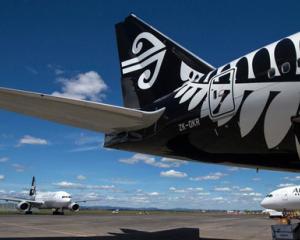Air New Zealand's profit plunge shows it would be the "worst time'' for the Government to sell shares in the company, Labour says.
The Government has flagged the airline as one of five state-owned assets it could sell shares in under its "mixed-ownership model'' plans.
Finance Minister Bill English last week admitted a Treasury prediction that the sales of Air NZ and four power companies would raise $6 billion was " just a guess'', and Opposition parties are now questioning how the airline's profits have been factored into that estimate.
Following news today that the airline's profits dropped 71 percent in the first half of the financial year, Labour reiterated its strong opposition to selling shares.
State-owned enterprise spokesman Clayton Cosgrove told APNZ the Government's plans showed it wanted to sell the company at any price.
"If anybody's done basic fifth-form business studies, they'll work out that if you're selling a business where the profit halves, it's probably likely that you won't maximise your return,'' he said.
"If your selling selling a business where the profitability's going gangbusters, then obliviously that will command a higher price.
"We say no time is a good time to sell, this time is the worst time to sell.''
Mr Cosgrove said it was a tough time for all companies, and he was not blaming the airline's current structure for the poor result.
"But it just adds to the lack of credibility for the sale. You're selling in a down market, if you're interested in maximising the value ... this is not a logical move,'' Mr Cosgrove said.
"Bill English has said with these SOEs `what we'll get, it's a best guess, who knows'. Well I think he's gone from best guess, to finger in the air, to getting a crystal ball out now.''
Green Party co-leader Russel Norman said he hoped the Government would reconsider the airline's sale on the back of today's result.
"In Bill English's guess, as he's described it, I wonder what the assumptions were of the underlying profitability of Air NZ, and presumably he hasn't taken this into account ... it's got to put downward pressure on the price they're going to get,'' Dr Norman said.
"It does just go to demonstrate the problems of privitising in a very uncertain global economic environment.''
Dr Norman said the risks were perhaps even more apparent in the case of Air NZ, compared with the domestic power companies slated for sale.
"International tourism is quite susceptible to global downturns, whereas if you're a domestic electricity generator, it has some impact but you're not as vulnerable to it.''
Prime Minister John Key hinted earlier this week that any sale of Air NZ shares could be delayed until the aviation market picked up, and
State-owned Enterprises Minister Tony Ryall echoed that today.
"No decisions have been made about the timing of a sale of part of the Government's shareholding in Air New Zealand. So speculation about market conditions is premature,'' Mr Ryall said.




